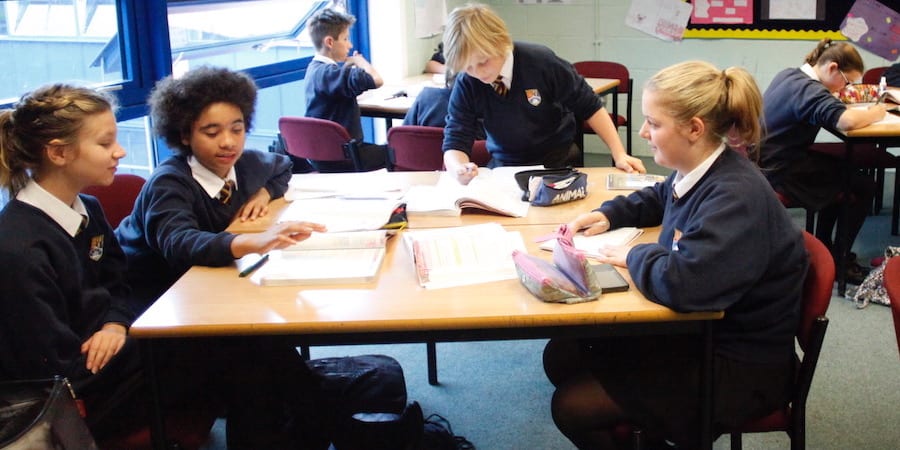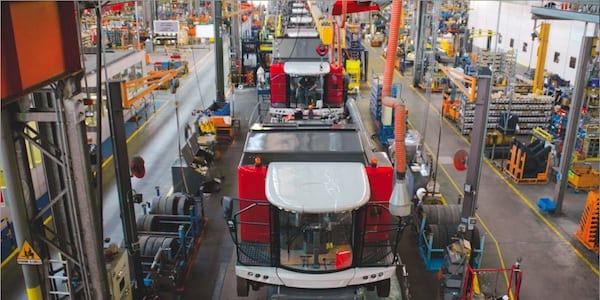
Developing lean coaches to improve outcomes for students
INTERVIEW – Christleton Learning Trust in the UK is running several lean experiments across its three schools. We spoke with its CEO, who told us how coaching is supporting the transformation.
Interviewee: Tony Lamberton, CEO, Christleton Learning Trust
Roberto Priolo: Can you provide a brief overview of the lean journey of the Christleton Learning Trust, please?
Tony Lamberton: The Trust includes three schools: Christleton High School (featured in a previous Planet Lean article), Christleton International Studio, and Queen’s Park High School. Our journey began in September 2013, when we attended a training course at Toyota to understand the lean process. We first applied the lessons we learned at Christleton High School, where we tried to increase our impact on the development of children with learning difficulties. We also applied lean techniques – to varying degrees of success, but always with many takeaways – to improving the way we teach science and run our sports activities.
At the beginning of last month, we opened a new school – which we like to think of as the “first lean school in the UK”. It’s a unique environment: we have removed all hierarchy, paperwork, and back-office functions, designing curricula and activities with the students’ needs always in mind (we see them as customers, not products). Christleton International Studio offers an International Baccalaureate Career program and a Diploma program, the first new school in the world to be approved at the same time to teach both.
Lean is also helping with the Trust’s third school, which was going through a difficult time. We have been working hard on improving it for a year already, but it is really in the next 12 months that we think we will take the school to the level of achievement and performance it’s capable of, as we pursue a pretty tough lean transformation.
So, what started with one experiment at Christleton High School four years ago has now turned into a full-on turnaround.
RP: You have a very effective coaching system in place at the Trust. How does it support the lean transformation?
TL: Coaching has worked on a lot of levels for us. Our journey aimed to migrate from instruction to coaching, which in our minds means empowering learners to take knowledge further (whether they be members of staff who want to improve the way they communicate or the students themselves). It creates the circumstances for an individual to engage in deep learning.
In the new school, for example, each student has a personal coach, whom he or she meets once a week. Anyone can be a coach: we have a core team trained already, of course, but it will be great to see that team grow as we find more and more potential great coaches, especially among the students, that we can develop. IT is a great example: students are often much more fluent in it than teachers, so it’s important that the teachers are open and humble enough to take that coaching from their students. It’s important for us to create an environment where we learn together, which in turn leads to mutual respect.
RP: How do you identify potential coaches?
TL: This is where lean helps hugely by making the coaching systematic and helping us focus on the problem to be solved. We have been very clear about the outcomes we want, and looked for the coaching talent fit that would allow us to get there, rather than rely on a traditional coach-grading system. Starting with the 17 staff members we have already trained, we have been looking for people with the skills and knowledge we needed to improve the area of the school we were targeting at the time. It all starts with knowing what problem we are trying to solve.
RP: What are the most meaningful results you have achieved using this coaching approach?
TL: We use three years’ worth of metrics that show academic improvements and grade shifts (against national trends) in areas in which we moved towards coaching. We have observed both an improvement in the students’ attitude towards learning and a significant reduction in the number of instances in which they fail, as well as the all-important exam grade improvements.

RP: What is the biggest mistake you have made in your lean journey?
TL: Being impatient and failing to fully involve people in the process from the very start. To win people’s trust, I now realize we should have done more work up front. We are still struggling with embedded cultural perceptions that people always tend to go back to.
RP: In a recent column for PL, Jim Womack talked about a disconnect in the lean community between the early adopters who saw lean as a way to transform organizations and a younger generation that thinks that all there is to lean is coaching managers for localized improvements. Do you see this disconnect?
TL: I do. I have read a lot of about the Lean Startup, for example, and I think a lot of it is quite disconnected from the traditional idea of a lean transformation. Coaching is often used as a tool for quick fixes, when really we should strive to make it part of our culture. I see it as something that supports the lean transformation and the improvement process, not as an entity of its own.
RP: One final question, Tony. In your mind, what would a lean education system look like?
TL: It would be a system that truly understands and concentrates on its core purpose of developing global citizens who are fully equipped to start their professional lives. That’s why we have been working hard for the past three years to lay the strongest foundations possible for the new school: we hope to generate greater impact for young people by involving them in the process from the outset. In the UK, we have a 500-year-old system that is utterly unfit for purpose: it’s an amalgamation of previous entities, the purpose of many of which remains unknown to most of us. There is great work happening across the sector, but sadly it is still swimming against the tide.
THE INTERVIEWEE

Read more


COLUMN – Want to grasp the current situation? Then you must go to the gemba, but it would be a mistake to think that alone is enough to change your business… you also have to ask why and show respect.


NOTES FROM THE GEMBA – With a strong focus on quality and on solving problems once and for all, Paris Ouest Construction has managed to weather the storm of the recession, the author finds out during a gemba walk.


CASE STUDY - An approach based on Lean Daily Management System and experiments in a model area led an Italian manufacturer of combine-harvesters to become one of the leanest organizations in the Veneto region.


FEATURE – Can behaviors inspired by lean leadership help us to push back against our society’s ingrained racial bias? Our Brazilian colleagues discuss.

